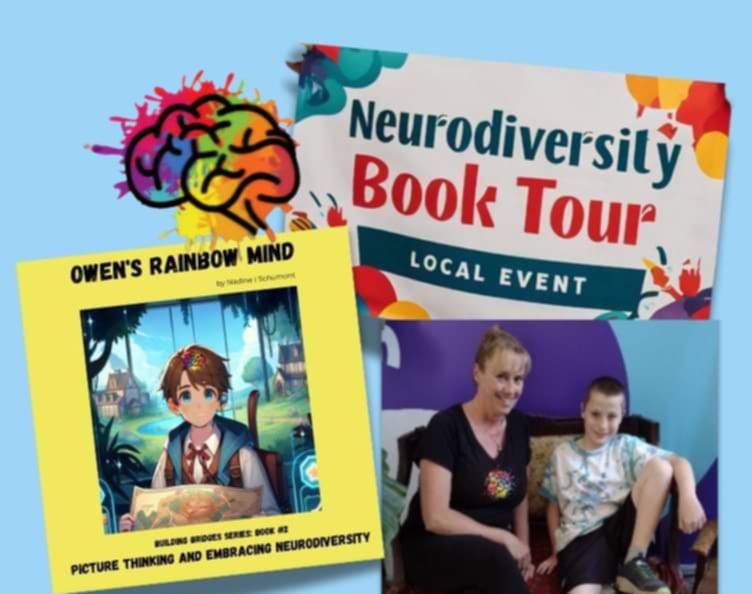Davis North America: Owen’s Rainbow Mind Inspires Young Readers
Libraries across the country are recognizing the power of neurodiversity programming to create inclusive spaces for all learners. This summer, our own Nadine Schumont demonstrated this commitment when she was featured at Stratford Public Library’s “Voices of the World” program on July 23.
From Client Inspiration to Community Education
Nadine shared her book Owen’s Rainbow Mind: A Mysterious Summer of Discovery — a story inspired by her client Owen and his younger brother Caleb. The book follows their magical summer adventure sparked by a mysterious map. Guided by a wise old owl, Owen learns to embrace his picture-thinking mind and use his unique strengths.
The story reflects the core philosophy behind the Davis Method: thinking differently isn’t a deficit — it’s a gift.
Interactive Learning That Makes a Difference
During the library event, participants engaged in interactive activities designed to help them step into Owen’s world. This hands-on approach mirrors the Davis Method’s signature clay-based learning techniques that help neurodivergent learners master concepts through tactile, visual experiences.
Recent research shows that libraries nationwide are developing programming specifically for neurodivergent youth and their families, creating sensory-friendly environments and autism-inclusive early literacy services. These initiatives recognize that different minds require different approaches to learning.

The Picture-Thinking Advantage
Neurodivergent individuals, including those with dyslexia, ADHD, and autism, tend to think non-verbally using mentally generated sensory impressions that can be visual, tactile, kinesthetic, or auditory. They are imaginative, creative, empathetic, and often solve problems by looking at the whole picture rather than working step-by-step.
This thinking style, which can seem challenging in traditional learning environments, becomes a superpower when properly understood and supported.
Beyond Accommodation: True Understanding
The Davis Method doesn’t rely on accommodations like special devices or medication. Instead, it teaches learners to:
- Master the orientation skills that eliminate confusion
- Create personal meaning for abstract concepts
- Use their natural picture-thinking abilities as learning tools
- Build permanent understanding rather than temporary fixes
The method is based on mastery — clients receive tools that enable them to master symbols and concepts that are foundations of learning and life. Once mastered, information is understood inherently and can transfer across situations and experiences.
Why Stories Matter
Owen’s story resonates because it shows a neurodivergent child discovering that being different is something to celebrate, not hide. Current research emphasizes the importance of books that promote respect and understanding for neurodiverse communities, advocating for positive learning environments that strive to make accommodations for all.
This aligns with our mission to help families understand that neurodiversity brings gifts alongside challenges.
Growing Recognition
Libraries are increasingly offering specialized programs for neurodivergent individuals, including sensory story times, neurodiversity clubs, and programming designed specifically for different learning styles. These programs recognize that traditional approaches don’t work for everyone.
The “Voices of the World” program at Stratford Public Library represents this growing awareness. By featuring stories like Owen’s, libraries help normalize different ways of thinking and learning.
The Davis Difference
As a Licensed Davis® Dyslexia Facilitator and Davis Autism Approach® Facilitator, Nadine brings unique insight to neurodiversity education. Nadine brings unique insight to neurodiversity education. Having completed the Davis® Program herself in 2018 after years of undiagnosed ADHD and dyslexia, she understands firsthand how life-changing this approach can be.
The Davis Method recognizes that dyslexic and many neurodivergent individuals are picture thinkers who experience perceptual disorientations in the senses of time, vision, hearing, and balance coordination. Nadine’s personal experience with these challenges allows her to connect with clients on a deeper level and guide them through their own transformation.
Rather than viewing these differences as problems to fix, the Davis approach teaches individuals to:
- Understand their unique learning style
- Develop self-regulation tools
- Master concepts through hands-on, creative methods
- Build confidence in their abilities
Looking Forward
Events like Nadine’s library presentation demonstrate the importance of community education about neurodiversity. When we share stories that celebrate different minds, we create a culture where all learners can thrive.
Whether you’re a parent, educator, or community member, understanding neurodiversity helps create more inclusive environments for everyone. After all, the world needs all kinds of minds — including rainbow minds like Owen’s.
Connect with Nadine here or find a Licensed Davis® Facilitator in you area here